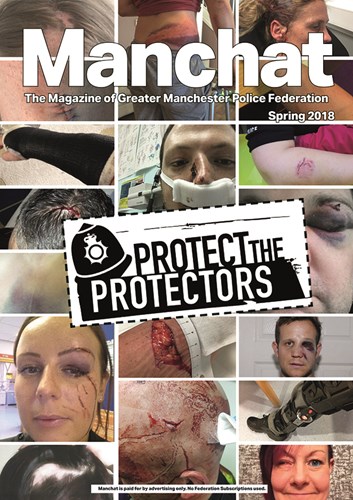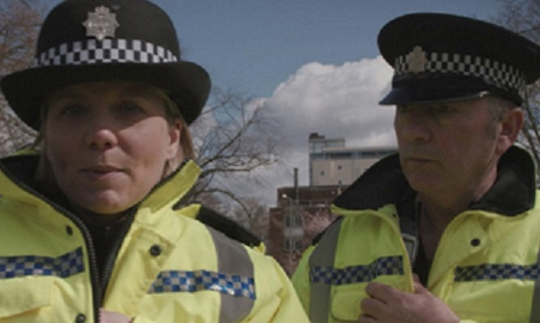Federation Chair: Officers Must Be Protected From Assault
2 March 2018

A message from GMP Chairman Ian Hanson:
An attack on a police officer is an attack on society. Our very powerful cover montage highlights the aftermath of attacks on police officers in both Manchester and across the UK.
It is why we as a Police Federation nationally continue to urge and lobby politicians to ensure that we #ProtectTheProtectors.
A Bill is currently progressing through Parliament to ensure tougher sentences for those who assault police officers, and you can see an interview with one of its architects – Holly Lynch MP – on page 10.
Not only do we want a change in legislation to help get tougher sentences for those who assault police and other emergency workers, but we are also seeking better training and access to equipment and wider roll-out of protection measures, such as Taser, body worn video and spit guards.
There were 25,125 assaults on police officers in England and Wales last year. That’s 483 a week. 69 a day.
In Manchester 1,391 officers in GMP were assaulted last year. That’s 27 every week. Four every single day.
Being assaulted is not part of our job. One assault is one too many.
The #ProtectTheProtectors Bill is back in the House of Commons for Report Stage and Third Reading on 27 April.
We look forward to politicians from all parties progressing this through Parliament.
Officer Numbers Matter
Greater Manchester Police can ill-afford to lose officers. There are 1,911 fewer police officers in Greater Manchester than there were in 2010. We had 8,148 colleagues in in 2010, we now have 6,237.
It’s an absolute scandal and the Government responsible for this – in coalition and on its own – should hang their heads in shame.
I remember 2010 and I remember we were only just about managing with 8,000-plus police officers. And to slash them down to a little over 6,000 is a disgrace.
Don’t lose sight of the fact, as well, that we’ve lost thousands of police staff members who perform valuable roles in supporting the frontline.
The police staff roles have just disappeared and most of them have to still be performed – and they’re being carried out by the police officers that remain.
At the same time we’ve got increased accountability, we’ve got increased threat, increased responsibility in terms of safeguarding. Everything is being piled onto policing… and yet more and more is being taken off us.
It seems that the Government is more bothered about properly funding those who tell police officers how to police, than actually supporting, backing and paying for an effective police service.
That should be a Government’s first and foremost responsibility, not funding people to tell us what they think we are doing wrong.
Wasting Public Money
The Independent Police Complaints Commission has become the Independent Office for Police Conduct – but it needs more than a name change.
It needs a complete overhaul. It needs turning upside down and inside out.
Recently in Greater Manchester we have seen, in my opinion, woeful incompetence across the board. We’ve seen terrible decision making. And it’s affecting our colleagues’ ability to do their job, as well as wasting hundreds of thousands of pounds of public money.
Yes, we need effective and robust governance, scrutiny and examination when things go wrong. Police officers do not fear this.
But we need the people making those decision to display a modicum of common sense.
It’s a point of incredible frustration for me that throughout its tenure, the IPCC displayed a wholesale lack of understanding of what its role is – and the nature and difficulties of policing. It has consistently failed to engage in any way to improve its performance.
Whatever the IPCC is called, it is an absolute liability, and a waste to the public purse.
Protecting the Protectors
As well as my pride at being Chairman of Greater Manchester Police Federation, I also have great pride at being the Chairman of the Police Treatment Centres. (The Trustees are pictured left.)
These treatment centres were set up in 1918 by a lady called Catherine Gurney.
After a young police officer was viciously assaulted on the streets of Harrogate, she found him in the local infirmary in a bed next to the offender who had attacked him. And surrounded by all the offender’s friends and family.
She recognised that police officers put themselves in the line of danger for the communities they serve, and she started the first of the Police Treatment Centres.
Over 100 years, that charity has gone from strength to strength, and we now have tens of thousands of police officers who every month contribute a small amount from their salaries in the hope that they will never need to make use of its facilities.
However, for those who do need them, they are accessing world-class physiotherapy and treatments on a residential basis, with the overwhelming priority being to return them safely back to work.
I’m also really proud that in recent times the Police Treatment Centres have been at the cutting edge of work to acknowledge and address the fact that mental health and wellbeing are real issues affecting real people in policing.
I remember, not that long ago, police officers used to hide mental health illnesses, hide depression and anxiety – and how PTSD was something that was never mentioned by officers for fear of appearing weak and affecting their future prospects within the service.
I’m really proud that the Police Treatment Centres have cut through that, and we now have 40 officers a week – on both sites in Harrogate, North Yorkshire and Auchterarder, Scotland –undergoing bespoke mental health and wellbeing programmes to deal with their particular issues.
This could be after they’ve dealt with horrific incidents or perhaps just been affected by the drip, drip, drip that is modern policing.
As always, stay safe.
See new edition of our Federation magazine featuring Ian's article here http://online.pubhtml5.com/ncsw/wpwu/



















